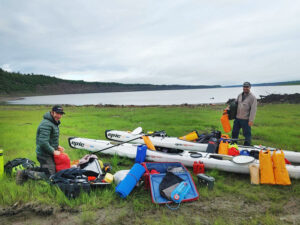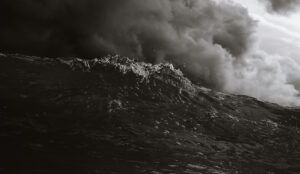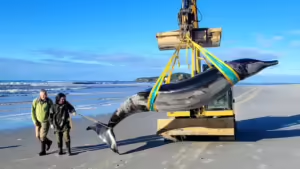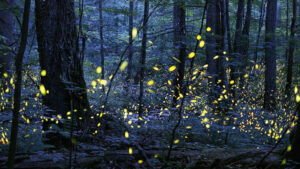The wild-bearded Polish super-kayaker Aleksander Doba died as he lived, in pursuit of adventure, passing away on the very summit of Mount Kilimanjaro at the age of 74.
Doba’s wizened but muscular frame and ancient, friendly face became familiar not just to the adventure world but to mainstream audiences when he kayaked across the Atlantic in 2017 at the age of 70 and became the first person to cross that ocean three times.
He was climbing Kili as part of a group but he split off to go at his own pace with his guides. He was not showing any symptoms of altitude sickness and he was in good spirits, his guides reported. When they met others near the first peak of Kilimanjaro, he told them he felt in great shape, shouted, “Wild Africa!”, and said that he was happy.
As Doba and his two guides reached the summit, Doba sat down to rest for a moment. He then lost consciousness. Efforts to resuscitate him failed, and he died shortly afterward. In such situations, a heart attack is often the cause, although we won’t be sure for some days.

Doba completing his second trans-Atlantic crossing. Photo: Iwona Bednarczyk-Jolley
In an earlier interview, Doba spoke of his desire to summit Kilimanjaro. “Kayaks did not dissuade me from other forms of exploring the world,” he said, admitting that he was fascinated by the name of this highest mountain in Africa. His planned tour also included a safari to two national parks, Tarangire and Ngorongoro, and a visit to the island of Zanzibar.
An avid river paddler and former whitewater slalom champion, Doba started kayaking in 1980. He circumnavigated Lake Baikal and the Baltic Sea and paddled 5,370km from his home in Poland to central Norway.
He first tackled the Atlantic at the age of 64. It wasn’t his idea. In 2003, a Polish professor contacted Doba, already a well-known kayaker, to get advice on paddling across the Baltic Sea. He managed to persuade Doba to cross the Atlantic with him from Ghana to Brazil. They were to use separate one-man kayaks and tie them together at night to sleep.

Doba after rudder repairs near Bermuda, 2014. Photo: Nicola Muirhead
The trip was a complete failure: Forty-two hours later, they washed back onto a beach, but Doba had found his new project. Once he was back in Poland, he swore never to kayak with a partner again and set about designing a craft that could make such a trip. By 2010, his kayak was ready. He named it Olo after his own nickname –- Olek.
In the fall of 2010, he began his crossing from Senegal to Brazil. This east-to-west route took him 99 days and was not at all pleasant. It was unbearably hot and humid, he was on the verge of sunstroke for much of the journey, his body was covered in salt rashes, he had an eye infection, and most of his fingernails and toenails peeled off.
His clothes became impossible to dry and irritated his skin, so he gave up on them and paddled naked. He also couldn’t hear anything for most of the trip, since he didn’t take his hearing aids with him: They weren’t waterproof, they were expensive and besides, there was no one to talk to, anyway.
When he finished, just one journalist and the Polish Ambassador in Brazil turned up to greet him. No one cared that he had just crossed the Atlantic in a kayak.

Doba during his second Atlantic crossing. Photo: Nicola Muirhead
Just days after his return to Poland, he began planning his second Atlantic crossing. He wanted to do three: South, Mid- and North Atlantic. His wife, Gabriela, thought he would change his mind, but she was wrong. In October 2013, both she and his son refused to drive him to the airport so that he could fly to Portugal and start his second trip. He went anyway.
The second crossing started well, but after a few months, his satellite phone stopped working. He pressed the Help button on his SPOT device, and a huge Greek ship showed up. The ship tried to rescue him three times but Doba just wanted his phone fixed and refused the ropes that were repeatedly thrown to him. Eventually, they gave up. Forty-seven days later, his phone started working again. Someone had simply forgotten to pay the phone bill.
During this trip, he had to stop in Bermuda to make repairs to his boat’s rudder. He spent a month on the island, then resumed paddling and made it to Florida in April 2014. This time when he returned home, he received a hero’s welcome and was named the 2015 People’s Choice Adventurer of the Year by the National Geographic Society.
Event producers asked him to say, in English, “Thank you very much” when he walked onto the stage. Doba, who wore jeans to the prestigious ceremony, said, “Polacy nie gesi i swoj jezyk maja,” which translates to “Polish people are not geese and have their own language.”
In May 2017, he began his third and final Atlantic crossing, intending to kayak from New Jersey to France. His wife admits that she was, “to be honest, a little pissed.” It was his second attempt at the crossing. He had to abandon the first after a few days because of weather and damage to his boat.
This last trip took him 110 days. He could have finished five days earlier because he passed only a few hundred metres from the UK coast. But he had promised himself that he would make it to the continent, so he continued onward to France.

Aleksander Doba. Photo: Travel Journal
This last journey was his most dangerous, and he endured multiple storms, 55-knot winds, towering waves, and broken equipment. At one point, during a two-day storm, the rope to his sea anchor snapped. Wearing just a harness, Doba had to crawl out of the cabin to set a new sea anchor. He was shocked that he made it back to the cabin alive.
Then his rudder bent, and he was unable to fix it. He was furious that he had to accept help from a passing freighter. And the ship’s captain was not keen on letting a 70-year-old man who was sleep-deprived and covered in rashes head back off into the ocean alone. Doba insisted.
He was a true explorer until the end. Doba spent over a year completely isolated in the middle of an ocean. He has 10 Guinness World Records to his name. But above all, Doba is proof that age does not matter when you are determined. He will remain an inspiration for generations to come.






